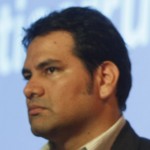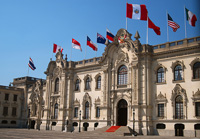 Samuel Rotta Castilla, Project Coordinator for Transparency International’s Peru chapter, Proética, talks about the risks of staying offside, or the challenges of corruption for Ollanta Humala’s new government.
Samuel Rotta Castilla, Project Coordinator for Transparency International’s Peru chapter, Proética, talks about the risks of staying offside, or the challenges of corruption for Ollanta Humala’s new government.
During the past ten years, the Peruvian governments’ efforts to tackle corruption appear to have gone astray. Initially, after the fall of Fujimori, there was a strong will and a great momentum to investigate and catch the members and leaders of the mafia. However, this was diluted.
An example of this is the special freedom awarded to a former television broadcaster Enrique Crousillat; and the current discussion of the possibility that Alberto Fujimori himself may be pardoned. Add to this the various scandals that have been uncovered, particularly in recent years and it is no wonder that the public is upset with this situation – a situation well reflected in several opinion polls conducted over the past year in which the public have registered corruption to be the country’s biggest problem.
Gana Peru, the leftist coalition that won the recent national elections, was presented to the citizens with a fairly strong anti-corruption profile. Ollanta Humala, the winning candidate, was acknowledged for this amongst other things, and his Government plan for the country was better prepared than those of his competitors which is not to say that it is technically excellent: there are still many gaps and it demonstrates a lack of understanding of certain processes currently taking place which is particularly worrying. On the other hand, Gana Peru have maintained that a significant part of the resources that they will need to implement the complex and extensive social inclusion plan that they are proposing, will come from funds that have been diverted from corruption (estimated at 12 billion Sol for the year 2010 – 15% of the national budget –as estimated by the General Comptroller of the Republic).
At this current time, in addition to the damage control that will be required for the possible pardon of Fujimori, Humala’s government must fulfil its promise to conduct a thorough investigation of the Garcia management, review state contracts with large businesses, particularly with regard to the sensitive issue of taxation, and ensure that the major corruption scandals uncovered during the past five years (Petroaudios, BTR, Cofopri, among many others) result in effective sanctions on those responsible, while maintaining the autonomy of the justice system.
Yet, there are also big challenges regarding the plans to implement the proposed public policy against corruption: it is still unclear who is to lead the fight against corruption; the laws on transparency and access to information that have been developed are strong but poorly implemented and even less guaranteed; a similar situation prevails with the laws regarding citizen surveillance; and finally the quality of controls and sanctions needs serious improvement, as impunity is one of the main factors that facilitates the daily reproduction of corruption.
Given the persistent, widespread and complex problem of corruption, the risk is that Humala’s government will fail to carry out the serious reforms needed, with the precarious position ahead, promising big changes that simply cannot be achieved. Peruvians regard corruption as the country’s main problem. Four in five think corruption increased in the last three years.
Read about TI’s work with local communities in Peru here.
















 Connect with us on Facebook
Connect with us on Facebook Follow us on Twitter
Follow us on Twitter